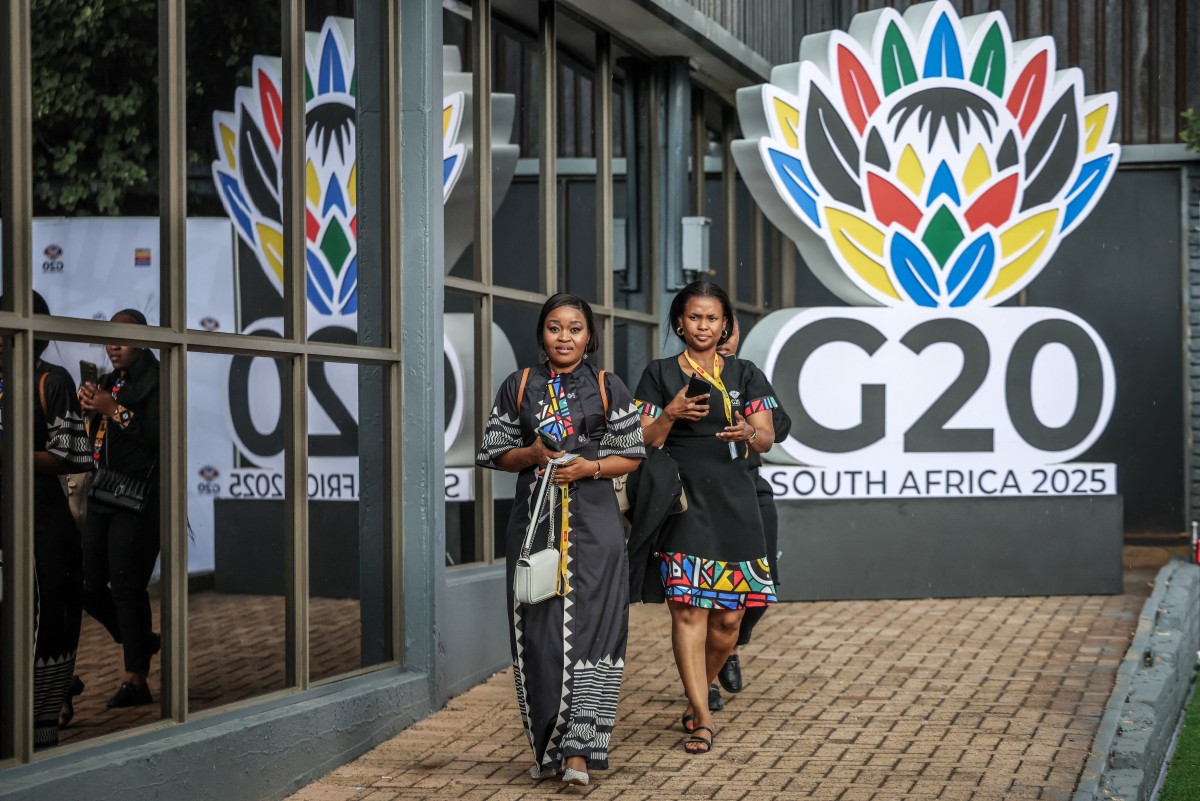OPED By Imran Khurshid, PhD
The first-ever G20 Summit on African soil has signalled a decisive shift toward a polycentric world order, where developing nations increasingly shape global norms and priorities. India’s leadership—rooted in civilizational ethos, inclusive diplomacy, and Africa-centred initiatives—stood out as a defining force in this historic moment.
The recent G20 Summit, held for the first time on African soil in Johannesburg from 22–23 November 2025, emerged at a critical geopolitical moment and reflected the shifting balance of global power.
The G20, established in 1999 to coordinate economic policies among major economies, has gradually evolved into a premier platform for global governance, addressing not only macroeconomic stability but also trade, climate, health, and sustainable development.
The 2025 Johannesburg Summit, under South Africa’s presidency with the theme “Solidarity, Equality, Sustainability,” focused on disaster resilience, debt sustainability for low-income nations, mobilizing finance for a just energy transition, sustainable management of critical minerals, inclusive industrialization, food security, and digital governance.
Leaders adopted a 122-point declaration that reflects a push toward greater multilateralism, amplifies the voice of developing countries, and emphasizes the need for more representative and equitable global governance structures.
This was unprecedented, as earlier G20 meetings often struggled to reach consensus even by the closing sessions. Yet in this case, the declaration was agreed upon on Day One — despite the United States’ complete refusal to participate and even though President Xi Jinping and President Vladimir Putin did not attend in person, instead sending senior representatives (China’s Premier Li Qiang and Russia’s Deputy Chief of Staff Maxim Oreshkin).
The strong unity displayed by the member states sent a clear message: the international system is becoming increasingly polycentric, and major global decisions can be shaped and implemented even without American participation.
The adoption of the declaration in the US’s absence underscored this shift, signalling that a new kind of multilateral confidence is emerging among the Global South and other middle powers.
What made this summit particularly significant was its strong focus on the priorities of the Global South. Issues such as sovereign debt burdens, equitable development, climate justice, and access to critical resources were at the centre of the discussions — precisely the themes that the Trump administration has consistently resisted.
Washington’s discomfort with the very framing of the summit was visible from the outset: the U.S. not only boycotted the meeting but openly criticised its theme.
Marco Rubio, serving as the U.S. Secretary of State, went so far as to accuse South Africa of promoting an “anti-American” agenda under the banners of “solidarity, equality, and sustainability,” dismissing the summit’s framework as little more than DEI rhetoric and climate activism.
His remarks reflected a deeper ideological divergence, revealing why the U.S., under Trump, chose to distance itself from a forum increasingly shaped by the voices of developing nations.
These tensions were not limited to disagreements over G20 priorities. In the months leading up to the summit, U.S.–South Africa relations had already deteriorated sharply. A widely reported meeting between President Trump and President Cyril Ramaphosa at the White House became a turning point.
During the encounter, Trump confronted Ramaphosa with video clips and claims alleging widespread mistreatment of white South African farmers, including accusations of killings and land seizures—claims that are widely disputed and considered overstated.
He even displayed images of white crosses to dramatize the issue, saying, “When they take the land … they kill the white farmer.”
Ramaphosa firmly rejected the allegations, emphasizing that South Africa had never targeted white farmers and noting that most victims of violent crime in the country are Black. The confrontational tone of the meeting, marked by interruptions and accusations, was seen by many in South Africa as disrespectful and humiliating.
This episode, along with U.S. criticism of South Africa’s land reform efforts—which Washington described as “expropriation without compensation”—further strained relations and contributed to the political friction surrounding the Johannesburg summit.
Yet the very act of adopting the declaration in the US’s absence showcased the growing confidence of developing countries and the emerging strategic importance of Africa in global decision-making.

India’s Growing Influence
This shift in the G20’s character did not happen overnight. Much of the groundwork had been laid during India’s presidency in 2023. At that time, India engaged in intense diplomatic negotiations to shift the G20’s agenda away from an exclusive focus on the Ukraine war—something Western countries insisted on—and toward the pressing concerns of developing nations.
Inflation, starvation, debt restructuring, sustainable development, climate justice, and the disproportionate impact of the Ukraine conflict on poorer regions were all brought to the forefront due to India’s sustained efforts.
It was also during India’s presidency that the African Union was admitted as a permanent member of the G20, a historic development that reflected both India’s growing diplomatic influence and its commitment to reshaping the global governance architecture in favour of the Global South.
Beyond policy, India advanced normative contributions, emphasizing inclusive governance, equitable development, climate justice, and the participation of citizens and developing nations in shaping global agendas, thereby reinforcing the principle that international decision-making should be fair, representative, and oriented toward human and environmental well-being.
Against this background, India’s participation in the 2025 Summit in Africa carried even greater significance. Prime Minister Narendra Modi received a warm welcome upon arrival, and his presence was widely appreciated across delegations.
The summit also reflected the broader transformation underway in global governance, with Indonesia, India, and Brazil—three major voices of the Global South—having presided over the G20 consecutively before South Africa took over in 2025. Modi’s visit to South Africa was his fourth, following his earlier engagements in 2016, 2018, and 2023, underscoring the deepening relationship between the two nations.
In his address, PM Modi spoke at length about the need to rethink current development paradigms. He argued that the existing parameters of growth have excluded large sections of the world and have pushed nature to the brink of overexploitation.
Drawing on India’s civilizational ethos, he emphasised the principle of “integral humanism,” a holistic philosophy that views the individual, society, and nature as an interconnected whole.
As he remarked, “we will have to look at the individual, society and nature as an integrated whole—only then can true harmony between progress and nature be achieved.”
Modi stressed that global development must henceforth be rooted in a more humanistic and harmonious approach, recognising that progress, sustainability, and cultural wisdom are not mutually exclusive.
He also highlighted some of the world’s most urgent challenges. The drug–terror nexus, he said, is not only a threat to public health but also a major source of terrorism financing. He urged countries to strengthen global instruments for financial tracking, governance, and security. Modi further underlined the growing competition over critical and emerging technologies, noting how these technologies are often weaponized for geopolitical leverage.
To counter this, he called for a fundamental shift toward human-centric, open-source, and globally inclusive technological frameworks. India, he said, has already integrated this vision into its initiatives, promoting innovations that encourage recycling, urban mining, and second-life batteries to reduce dependence on primary mineral extraction—especially relevant at a time when China maintains a tight grip over critical mineral supply chains.
Africa At The Centre Of India’s G20 Vision
Modi also stressed the importance of preserving traditional and indigenous knowledge systems, proposing the creation of a global repository that can safeguard humanity’s collective wisdom.
As he noted, “There are many communities across the world that have preserved their traditional and eco-balanced lifestyles. These traditions reflect cultural wisdom, social cohesion, and a deep respect for nature. India proposes that a Global Traditional Knowledge Repository be established within the G20. This platform will help transmit humanity’s collective wisdom to future generations.”
Turning to global health vulnerabilities, he suggested forming a joint health emergency response team comprising experts from all G20 nations, enabling swift, coordinated action during pandemics and natural disasters. His emphasis on disaster resilience was similarly forward-looking; he welcomed South Africa’s focus on the subject and recalled that India had established the Disaster Risk Reduction Working Group during its 2023 presidency.
He argued for moving from a response-centric model to a development-centric one, linking nutrition, agriculture, public health, and preparedness into a comprehensive framework.
A major highlight of India’s contribution was its focus on Africa. Modi proposed the G20–Africa Skills Multiplier Initiative, aimed at empowering Africa’s youth through a “train-the-trainer” model that could produce 1 million certified trainers over the next decade.
He stressed that Africa’s development and the empowerment of its young population are in the interest of the entire world, underscoring that such cooperation would contribute to global stability and wider economic opportunity. As he put it, “Advancing Africa’s development and empowering its young talent is in the interest of the entire world.”
India’s role at the 2025 Summit reaffirmed its growing stature as both an agenda-setter and a bridge-builder. It demonstrated India’s ability to influence global discourse, reshape priorities, and provide practical solutions to shared challenges.
It also showcased India’s civilizational soft power and its capacity to mediate between the Global North and Global South at a time when global governance is undergoing a profound transition.
Ultimately, the G20 Summit in Africa symbolized a notable moment in the ongoing transition toward a more multipolar global landscape.
The adoption of the declaration without the US, despite geopolitical tensions, underscored the growing agency of developing countries. It also reflected the long-term impact of India’s diplomatic efforts since 2023 to make the G20 more inclusive, representative, and reflective of real global concerns.
Together, these developments signal a new direction for global governance—one in which cooperation is not shaped by a single power, but by a coalition of nations working toward equity, justice, and sustainable development.
- Dr. Imran Khurshid is an Associate Research Fellow at the International Centre for Peace Studies (ICPS), New Delhi. He specializes in India-US relations, Indo-Pacific studies, and South Asian security issues.
- THIS IS AN OPINION ARTICLE




